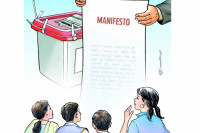National
623 local units get the go-ahead for implementing the Prime Minister Employment Programme
The government has revised guidelines to avoid misuse of state funds and aims to provide 100-days of work for some 60,000 unemployed persons this fiscal year..jpg&w=900&height=601)
Chandan Kumar Mandal
As many as 623 local units are implementing the Prime Minister Employment Programme, the government’s much-talked-about initiative to provide a minimum number of paid work days to unemployed citizens. The programme is in the first phase of its execution.
The Ministry of Labour, Employment and Social Security has allocated Rs2 billion to only those local units that have submitted full details of the projects that they plan on implementing under the Prime Minister Employment Programme this year.
Unlike last year, which was also the first year of the programme’s implementation, this year, interested local units had to submit project proposals to receive their budgets under the programme.
“Every local unit can seek a budget under the programme, but only those who could furnish details of the projects have been selected for the first phase,” said Suman Ghimire, spokesperson for the labour ministry. “Remaining local units will be eligible to apply in the second phase, once they submit their project proposals.”
While distributing the funds, every local unit has been given a budget - from a minimum of Rs1 million to Rs7.5 million, based on the number of unemployed citizens in their respective localities. Local units should strictly spend at least 70 percent of the allocated budget on payment for work to the registered citizens, as per the operational guidelines of the programme.
The employment was rolled out to provide a minimum 100-days of employment opportunity to unemployed citizens in the working-age group (18 to 59 years). However, last year, it could only generate 13 days of work on average to a total of 175,909 applicants due to a delay in programme implementation.
According to Ghimire, this year, the programme is being implemented following a demand-based approach.
“Locals units had to express their interest before seeking budgets under the programme. This will create ownership among them and help in the programme implementation,” said Ghimire.
Last year, the employment programme had invited a series of criticisms for squandering money over unproductive and trivial works like rearing stray animals and gardening, although the programme is intended to mobilise registered citizens into community-level infrastructure development projects.
This year, the ministry looks to be careful about how the money would be spent, by effectively making some operational changes.
Projects related to sanitation and rearing cattle have been removed from the total 24 types of projects, which include road construction and improvements, tree plantation, public toilet construction, drainage repair, playground improvements, soil irrigation, drinking water and irrigation projects and trekking trail building.
“These projects should be community development projects. Most of the project proposals approved this year are for rural roads, construction of dams and public toilets,” said Ram Chandra Dhakal, chief of the Prime Minister Employment Programme. “But the programme is not only about building infrastructure. It is mainly concerned about providing social protection to the unemployed and the marginalised sections.”
Although the implementation of the programme has been late, the labour ministry hopes to generate 100-days of paid work to some 60,000 registered applicants.
According to the ministry, more than 1.3 million have registered as unemployed under the Employment Management Information System, the government database of maintaining data on registered unemployed citizens.
“The final verification of the enrolled citizens will take place before they are given work,” said Dhakal. “The number of registered groups will eventually come down, as the wage-employment scheme is only for the ultra-poor groups.”




 10.12°C Kathmandu
10.12°C Kathmandu















